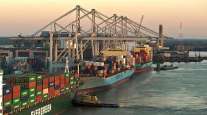Senior Reporter
Diesel Rises 2.6¢; Biden Stops Development of Keystone XL Pipeline

[Stay on top of transportation news: Get TTNews in your inbox.]
Truckers are continuing to see higher diesel prices as the nationwide cost of trucking’s main fuel rose 2.6 cents, the Energy Information Administration reported Jan. 18.
Diesel now costs $2.696, up from $2.67 the week before — but still 34.1 cents less expensive than a year ago.
Meanwhile, the nationwide average price of gasoline surged 6.2 cents to $2.379 a gallon. That’s a 13-cent increase since Jan. 4 but still 15.8 cents lower than at this time last year.
The price of diesel rose in all 10 regions EIA surveys.

Home | Video | Heroes' Photo Gallery
Saluting the men and women of the trucking industry who kept America's essential goods flowing during the coronavirus pandemic.
Heroes: Peter Lacoste | Susan Dawson | James Rogers | Reggie Barrows | Kevin Cooper | Cesar Quintana Moreno
The largest gain came in the New England region, where diesel jumped 6.4 cents a gallon to $2.764. Diesel in that region costs 36.8 cents a gallon less than it did a year ago.
The smallest increase was in the West Coast region (not including California) where diesel increased 1.1 cents a gallon to $2.804. Diesel in that region is 40.2 cents less expensive than in the 2020 period.
The most expensive diesel is in California, where a gallon costs $3.448 after rising 2.1 cents. But diesel in the Golden State is still 41.8 cents less expensive than it was at this time a year ago.
Diesel was least expensive along the Gulf Coast, home to much of the nation’s oil production and refining capacity. The price of the fuel there rose 3.2 cents to $2.461 a gallon. Despite the increase, diesel costs 33.6 cents less along the Gulf Coast than at this time in 2020.

Biden
The broader oil market could feel the effects of the new presidential administration. Hours after his Jan. 20 inauguration, President Joe Biden via executive order stopped development of the fourth and final stage of the controversial Keystone XL Pipeline. Three of the four stages are complete.
The section Biden stopped would enter the U.S. from Canada at Morgan, Mont., and travel through Baker, Mont. From there, oil would travel through South Dakota and into Nebraska, where it would join the existing Keystone pipelines in Steele City, Neb.
This section of the pipeline continues to generate controversy because of its routing over the Sand Hills in Nebraska and claims by Native Americans that the route would cross land that may affect their spiritual practices. They also said the pipeline could pose a threat to safety due to the influx of construction workers into small communities.
Environmental groups cited the possibility of damage caused by the construction and oil leaks.

Welders work on a joint between two sections of pipe during construction of a portion of the Keystone XL Pipeline in Prague, Okla., in 2015. (Daniel Acker/Bloomberg News)
The action reverses a decision on the project championed by former President Donald Trump, who issued a permit allowing the pipeline to cross the U.S.-Canada border during the early months of his presidency.
Biden cited the fight against climate change as the main reason for the move.
“The United States and the world face a climate crisis,” the order said. “That crisis must be met with action on a scale and at a speed commensurate with the need to avoid setting the world on a dangerous, potentially catastrophic, climate trajectory. Leaving the Keystone XL pipeline permit in place would not be consistent with my administration’s economic and climate imperatives.”
Biden also halted oil and gas leasing at a wildlife refuge in Alaska by executive order, and placed a temporary hold on oil and gas leasing at the Arctic National Wildlife Refuge. The refuge is home to grizzly bears, polar bears, gray wolves and dozens of bird species.

Trudeau
Canadian Prime Minister Justin Trudeau said in a statement he had spoken in November to Biden about the pipeline and had urged him to continue with its development.
“While we welcome the president’s commitment to fight climate change, we are disappointed but acknowledge the president’s decision to fulfill his election campaign promise on Keystone XL,” Trudeau said Jan. 20.
Five Republican senators also were critical of the president’s decision, saying thousands of good, high-paying jobs would be eliminated if the pipeline is stopped.
The U.S. Chamber of Commerce was also critical of the decision.

Durbin
“The pipeline — the most studied infrastructure project in American history — is already under construction and has cleared countless legal and environmental hurdles,” the Chamber’s president of its Global Energy Institute, Marty Durbin, said in a statement. “This is a politically motivated decision that is not grounded in science.”
The pipeline was designed to carry up to 830,000 barrels of crude oil per day from Hardisty, Alberta, to Steele City, Neb.
As a result of the executive order, the pipeline’s owner, TC Energy, appears ready to suspend the project, saying in a statement, “As a result of the expected revocation of the presidential permit, advancement of the project will be suspended.”
Want more news? Listen to today's daily briefing:
Subscribe: Apple Podcasts | Spotify | Amazon Alexa | Google Assistant | More




